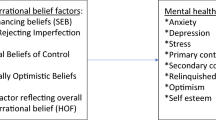Abstract
Some have speculated that explanatory style puts an individual at risk for illness. Study 1 supports this hypothesis by showing that college students who believe that stable + global factors caused bad events experienced more days of illness in the following month and visited physicians more frequently in the following year than students who explain bad events with unstable + specific causes. These findings held even when level of previous illness was controlled. Study 2 explores some of the possible links between explanatory style and poor health. College students who believe that stable + global factors caused bad events reported more unhealthy habits, lower efficacy to change these habits, and more stressful occurrences than students who explain bad events with unstable + specific causes.
Similar content being viewed by others
References
Abramson, L. Y., Seligman, M. E. P., & Teasdale, J. D. (1978). Learned helplessness in people: Critique and reformulation.Journal of Abnormal Psychology, 87 49–74.
Anderson, C. A., Horowitz, L. M., & French, R. deS. (1983). Attributional style of lonely and depressed people.Journal of Personality and Social Psychology, 45 127–136.
Angell, M. (1985). Disease as a reflection of the psyche.New England Journal of Medicine, 312 1570–1572.
Antonovsky, A. (1984). The sense of coherence as a determinant of health. In J. D. Matarazzo, S. M. Weiss, J. A. Herd, and N. E. Miller (Eds.),Behavioral health: A handbook of health enhancement and disease prevention (pp. 114–129). New York: Wiley.
Bandura, A. (1986).Social foundations of thought and action: A social cognitive theory. Englewood Cliffs, New Jersey: Prentice-Hall.
Barrera, M., Sandler, I. N., & Ramsey, T. B. (1981). Preliminary development of a scale of social support: Studies on college students.American Journal of Community Psychology, 9 435–447.
Beck, A. T. (1967).Depression: Clinical, experimental, and theoretical aspects. New York: Hoeber.
Beck, A. T., Rush, A. J., Shaw, B. F., & Emery, G. (1979).Cognitive therapy of depression. New York: Guilford Press.
Becker, M. H. (1974).The health belief model and personal health behavior. Thorofare, New Jersey: Slack.
Cobb, S. (1976). Social support as a moderator of life stress.Psychosomatic Medicine, 38 300–314.
Cronbach, L. J. (1951). Coefficient alpha and the internal structure of tests.Psychometrika, 16 297–334.
Engel, G. L. (1971). Sudden and rapid death during psychological stress: Folklore or folkwisdom?Annals of Internal Medicine, 74 771–782.
Jemmott, J. B., & Locke, S. E. (1984). Psychosocial factors, immunologic mediation, and human susceptibility to infectious disease: How much do we know?Psychological Bulletin, 95 78–108.
Kamen, L. P., Seligman, M. E. P., & Rodin, J. (1986). Unpublished data, University of Pennsylvania.
Kobasa, S. C. (1979). Stressful life events, personality, and health: An inquiry into hardiness.Journal of Personality and Social Psychology, 37 1–11.
Laudenslager, M. L., Ryan, S. M., Drugan, R. C., Hyson, R. L., & Maier, S. F. (1983). Coping and immunosuppression: Inescapable but not escapable shock suppresses lymphocyte proliferation.Science, 221 568–570.
Lazarus, R. S. (1979). Positive denial: The case of not facing reality.Psychology Today, 13 44–60.
Lefcourt, H. M. (1973). The function of the illusions of control and freedom.American Psychologist, 28 417–425.
Marx, M. B., Garrity, T. F., & Bowers, F. R. (1975). The influence of recent life experiences on the health of college freshmen.Journal of Psychosomatic Research, 19 87–98.
O'Leary, A. (1985). Self-efficacy and health.Behaviour Research and Therapy, 23 437–451.
Peterson, C., Bettes, B. A., & Seligman, M. E. P. (1985). Depressive symptoms and unprompted causal attributions: Content analysis.Behavioural Research and Therapy, 23 379–382.
Peterson, C., Luborsky, L., & Seligman, M. E. P. (1983). Attributions and depressive mood shifts: A case study using the symptom-context method.Journal of Abnormal Psychology, 92 96–103.
Peterson, C., Schwartz, S. M., & Seligman, M. E. P. (1981). Self-blame and depressive symptoms.Journal of Personality and Social Psychology, 41 253–259.
Peterson, C., & Seligman, M. E. P. (1984). Causal explanations as a risk factor for depression: Theory and evidence.Psychological Review, 91 347–374.
Peterson, C., & Seligman, M. E. P. (1987). Explanatory style and illness.Journal of Personality, 55 237–265.
Peterson, C., Semmel, A., von Baeyer, C., Abramson, L. Y., Metalsky, G. I., & Seligman, M. E. P. (1982). The Attributional Style Questionnaire.Cognitive Therapy and Research, 6 287–299.
Peterson, C., & Villanova, P. (1986).Dimensions of explanatory style. Unpublished manuscript, University of Michigan.
Peterson, C., Villanova, P., & Raps, C. S. (1985). Depression and attributions: Factors responsible for inconsistent results in the published literature.Journal of Abnormal Psychology, 94 165–168.
Rabkin, J. G., & Struening, E. H. (1976). Life events, stress, and illness.Science, 194 1013–1020.
Richter, C. P. (1957). On the phenomenon of sudden death in animals and man.Psychosomatic Medicine, 19 191–198.
Rodin, J., Timko, C., & Anderson, S. (1985). The construct of control: Biological and psychosocial correlates. In P. Lawton & G. Maddox (Eds.),Annual review of gerontology and geriatrics (Vol. 5). New York: Springer.
Schleifer, S. J., Keller, S. E., Siris, S. G., Davis, K. L., & Stein, M. (1985). Depression and immunity.Archives of General Psychiatry, 42 129–133.
Seeman, M., & Seeman, T. E. (1983). Health behavior and personal autonomy: A longitudinal study of the sense of control in illness.Journal of Health and Social Behavior, 24 144–160.
Seligman, M. E. P. (1975).Helplessness: On depression, development, and death. San Francisco: Freeman.
Suls, J., & Mullen, B. (1981). Life events, perceived control, and illness: The role of uncertainty.Journal of Human Stress, 7 30–34.
Taylor, R. B., Denham, J. R., & Ureda, J. W. (1982).Health promotion: Principles and clinical applications. Norwalk, Connecticut: Appleton-Century-Crofts.
Wallston, K. A., & Wallston, B. S. (1982). Who is responsible for your health? The construct of health locus of control. In G. S. Sanders & J. Suls (Eds.),Social psychology of health and illness (pp. 65–95). Hillsdale, New Jersey: Erlbaum.
Author information
Authors and Affiliations
Rights and permissions
About this article
Cite this article
Peterson, C. Explanatory style as a risk factor for illness. Cogn Ther Res 12, 119–132 (1988). https://doi.org/10.1007/BF01204926
Issue Date:
DOI: https://doi.org/10.1007/BF01204926




